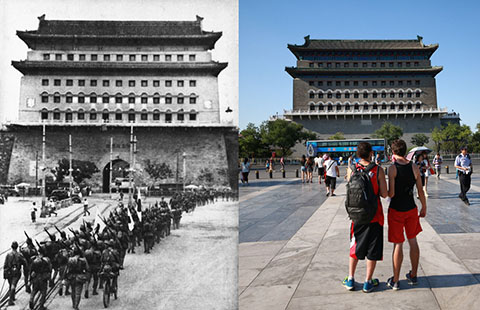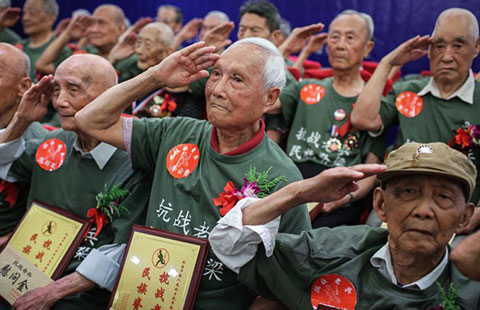Net addicts focus of film
Updated: 2015-07-06 06:27
By PAUL WELITZKIN in New York(China Daily USA)
|
||||||||
Compulsive Internet usage is a growing problem as more devices enable people to connect to the web. In China, which has the greatest number of Internet users in the world – 632 million as of July 2014 – Internet addiction is also rising, particularly among teenagers.
The government believes that 10 per cent of its Internet-surfing minors – 24 million – are addicted. China was the first country to diagnose Internet addiction as a clinical disorder, and in 2008 the country declared it a top health threat for its youth.
“We are talking about young people (13-18 years old) who are online day and night. You can find them in Internet cafes and in some cases even wearing diapers so they won’t miss a moment,” said Shosh Shlam, who, along with Hilla Medalia, produced and directed Web Junkie, a documentary on the treatment of Chinese teens with a preference for the virtual world over the real one. The film will be shown on July 13 on the PBS television series POV (Point of View).
Israeli filmmakers Shlam and Medalia highlight a three-month treatment program at a military base that was established by Tao Ran, an Internet addiction psychiatrist and a senior colonel in the People's Liberation Army. Medalia said Tao gave permission for the filming. “We didn’t ask for government permission,” she said in an interview with China Daily.
She said Tao uses an environment of strict military discipline.
“It’s a combination of a military boot camp and treatment program with therapy. Many of the patients are forced into the program by their parents,” Shlam said. “The parents can participate in the therapy programs if they want to.”
Tao believes that Internet addiction is a major public health hazard in China. “He believes the West can learn from his research and the problem is very similar to drug or alcohol addiction,” added Medalia.
“Many of these teens don’t interact much with their families or with classmates,” added Medalia. “All of their friends are online.”
China’s educational system emphasizes computer skills, which contributes to the problem indirectly, said Shlam.
Medalia said parents pay about 10,000 yuan ($1,610.46) to attend Tao’s treatment center. Shlam said many of the teens are from the new middle class that is developing in China. She estimates about 80 percent are boys and 20 percent are girls and most are from urban areas.
“A lot of them don’t have Internet access at home so they must go to an Internet cafe,” Medalia said. “You are supposed to be of a certain age to get in but enforcement is spotty at best.”
The documentary offers a candid view of Tao's treatment program and also raises questions. “Can this technique work in other countries and cultures?” said Shlam.
Medalia said Tao claims a 70 percent success rate in curing Internet addiction..
In an article published in January 2015 in the London Daily Telegraph, Tao said that if someone is spending six hours or more on the Internet, his clinic considers them addicted, and that he considers a patient cured if they use the Internet for less than six hours a day six months after leaving the center.
The newspaper said there was no way of accurately substantiating Tao's success claim, though it said 300 other clinics in China use elements of his model, mainly military discipline.
paulwelitzkin@chinadailyusa.com
- Injured ROK tourists in intensive care
- 36 dead, 26 missing after banca capsized in C. Philippines
- Thai navy plans to buy three Chinese subs
- Mass casualties in Indonesian military plane crash
- Japan's LDP lawmaker denounces Abe's security policies
- More than 100 feared dead in Indonesian military plane crash

 Then and Now: Beijing’s historic sites as witnesses of war
Then and Now: Beijing’s historic sites as witnesses of war
 In photos: China from above
In photos: China from above
 Serena Williams beats sister Venus to reach last eight
Serena Williams beats sister Venus to reach last eight
 Culture insider: Six things you may not know about Minor Heat
Culture insider: Six things you may not know about Minor Heat
 Fancy sculptures sparkle in Chongqing
Fancy sculptures sparkle in Chongqing
 Ten photos you don't wanna miss - weekend special
Ten photos you don't wanna miss - weekend special
 US beat Japan 5-2 to win Women's World Cup
US beat Japan 5-2 to win Women's World Cup
 Veterans of World War II honored
Veterans of World War II honored
Most Viewed
Editor's Picks

|

|

|

|

|

|
Today's Top News
China answers Clinton charges
President Obama addresses IS threat
China has ability to deal with risks to economy: premier
Govt prefers peaceful means in resolving maritime row: Envoy
China predicts Greece to stay in eurozone
Chinese stocks struggle to maintain rally in afternoon
Greece enters uncharted territory after referendum 'no' vote
Chinese embassy warns travelers to be careful in Turkey
US Weekly

|

|






